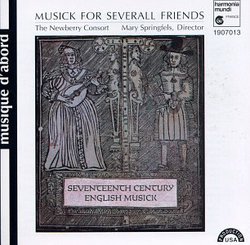| All Artists: Paul Banister, Henry [composer] Butler, Matthew Locke, Johann Schop, Christopher Simpson, John Wilson, Newberry Consort, Drew Minter, The Newberry Consort, Mary Springfels Title: Music for Several Friends Members Wishing: 0 Total Copies: 0 Label: Harmonia Mundi Fr. Release Date: 6/10/1996 Album Type: Import Genres: Special Interest, Pop, Classical Styles: Vocal Pop, Chamber Music, Historical Periods, Baroque (c.1600-1750) Number of Discs: 1 SwapaCD Credits: 1 UPC: 093046700324 |
Search - Paul Banister, Henry [composer] Butler, Matthew Locke :: Music for Several Friends
 | Paul Banister, Henry [composer] Butler, Matthew Locke Music for Several Friends Genres: Special Interest, Pop, Classical
|
Larger Image |
CD Details |
CD ReviewsAn unusual program full of rarities Leslie Richford | Selsingen, Lower Saxony | 04/09/2006 (5 out of 5 stars) "Musick for Severall Friends. Seventeenth Century English Musick. Performed by Drew Minter, countertenor, and the Newberry Consort (Mary Springfels, direction and viola da gamba; David Douglass, pre-baroque violin; Kevin Mason, lute and theorbo).
Recorded in July, 1988, at Lone Mountain College Chapel, San Francisco, California. Harmonia Mundi USA, originally published as HMU 907013, re-issued in 1996 as HMA 1907013. The first thing that strikes one about this disc is the highly unusual repertoire: 12 songs by the relatively little-known John Wilson (1595 - 1674) plus a number of rare instrumental pieces by equally little-known composers such as Christopher Simpson, Henry Butler (an English Catholic who spent many years in Spain), Johann Schop (a German who presumabley learned these English-style tunes from ex-patriate William Brade) and Matthew Locke, the teacher of Henry Purcell. Of course, the Civil War and the Commonwealth in England (Cromwell!) made the first half of the 17th century a perilous one for musicians; all the more praise is due to Mary Springfels and the folks at the Newberry library in Chicago for digging up and sponsoring these enrapturing pieces which are here performed exquisitely, Drew Minter's silky countertenor seeming to be ideal for the songs, and Harmonia Mundi's heavenly engineering capturing the unusual sounds of the period instruments (of particular interest: David Douglass's pre-baroque violin) with a presence and clarity that leaves absolutely nothing to be desired. To be sure, this is an unusual program full of rarities (the only well-known piece is Wilson's Where the Bee Sucks), but it repays careful listening and is its own reward for any listener who is on the lookout for vocal or instrumental delights of the period and already has the chief works of the more mainstream composers." |

 Track Listings (24) - Disc #1
Track Listings (24) - Disc #1